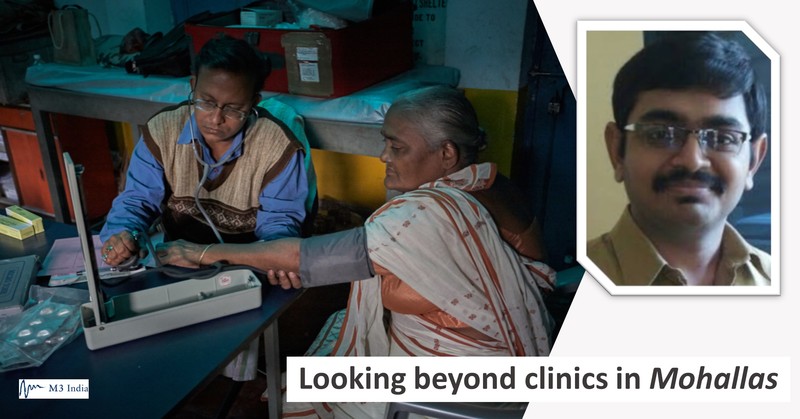Looking beyond clinics in mohallas: Dr. Soham D Bhaduri
M3 India Newsdesk Feb 21, 2020
Dr. Soham D Bhaduri comments on the importance governments give to strengthening preventive and curative primary healthcare in the country, the implementation of the former often losing out to the latter in urban settings.

This past week, I went on a visit to a project office of one of the well-known NGOs in Mumbai engaged in betterment of maternal and child health in the city, especially for the poor and the marginalised. At the inception, it is necessary to make it clear that the specific place being talked about is one of the posh localities and busiest hot-spots in the city, not a slum area.
Travelling my way on feet towards the destination from the railway station (a rare luxury considering the bustling life of the city), I was sickened and acutely dismayed with the insanitary conditions prevailing along most of the waysides. Heaps of fetid garbage lay exposed and open sewers of the width of a medium-sized road lay clogged and putrid. Knowledge of the fact that similar scenes are equally common in the majority of scintillating cities in India served to be a poor consolation.
Momentarily, I looked back on my stint in a rural primary health centre in Maharashtra years ago. A widely afloat misconception is that the greatest burden of insanitation and resultant ill-health prevails in India’s rural countryside. And it is intriguing to note that not just the laity but also the fields of medicine and public health still remain under its influence.
Historically, this mistaken belief has led to most of the preventive and promotive health efforts, including sanitation, to be targeted at villages, as if only villages needed preventive care while cities only needed curative healthcare. There is a formidable body of evidence showing that health indicators by and large in urban slums is, if anything, poorer than in rural areas. However, such evidence is scarcely required to back the objective judgement that a majority of rural areas would fare much better in terms of public sanitation than such parts of the city any day.
I hold that the massive election victory of the current ruling party in Delhi state is felicitous atleast as far as healthcare is concerned. Firstly, because it upheld the idea of primary healthcare strengthening as being politically attractive. An initiative as simple as providing outpatient consultations and basic medicines and tests for common illnesses has helped pull off an electoral miracle. Secondly, because the Mohalla clinics initiative has directed focus to the unmet need for primary healthcare in urban areas, especially poorer regions within them. While access to a health facility has been relatively better in urban over rural areas, most urban areas have fared poorly in terms of public primary healthcare infrastructure.
However, we need to remember that until this juncture, Mohalla Clinics have been de-facto consultation clinics providing mainly curative primary care consultations, with their role in population and preventive health being limited, and with limited coordination and synchrony with other social sectors needed for holistic improvement of health in cities. This, if anything, will severely limit the potential of these clinics to improve urban health.
Primary care encompasses much more than mere curative care and includes an inalienable population focus, where the health sector works in unison with multiple other sectors that target the social determinants of health.
It is vital – as much as an opportunity to improve urban primary healthcare has arisen – to utilise this opportunity to envisage bigger reforms for transforming urban healthcare, which may very well begin with Delhi. As such, it is necessary to not only widen the scope of Mohalla clinics but to firmly embed them in the urban health scenario – building, on the one hand, intra-sectorial linkages like referral, and strong inter-sectorial linkages on the other, whereby these clinics play a role in holistic improvement of health, including such pressing aspects as sanitation.
And you never know: apart from guaranteeing better prospects for urban health, this may also, very possibly, prove to be even more politically profitable than what mere “Clinics in Mohallas” have proven to be in these elections!
Disclaimer- The views and opinions expressed in this article are those of the author's and do not necessarily reflect the official policy or position of M3 India.
The write, Dr. Soham D. Bhaduri is a Mumbai-based doctor, healthcare commentator, and editor of the journal ‘The Indian Practitioner’. He can be reached at soham.bhaduri@gmail.com
-
Exclusive Write-ups & Webinars by KOLs
-
Daily Quiz by specialty
-
Paid Market Research Surveys
-
Case discussions, News & Journals' summaries